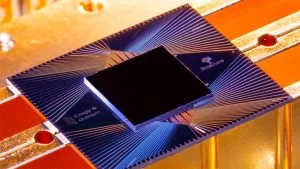Quantum supremacy is here, researchers from Google claim.
For the first time, a quantum computer has solved a problem that can’t be performed by a standard computer — at least not within a reasonable amount of time — Google announced October 23. This milestone, known as quantum supremacy, is a long-anticipated step toward useful quantum computers.
The researchers performed the task with a chip consisting of only 53 qubits, the quantum version of the bits found in everyday computers. “It’s fascinating that we can do something so powerful with such a small chip,” says quantum physicist Mária Kieferová of the University of Technology Sydney, who was not involved with the study.
But don’t expect quantum computers to suddenly take over. The calculation Google’s quantum computer performed was not a particularly useful one. Instead, the task at hand was one that was designed to play to quantum computers’ strengths and to be difficult for a nonquantum, or “classical,” computer.
What’s more, some researchers are pushing back against Google’s quantum supremacy claim, arguing that the milestone has yet to be achieved.
For about a month, rumors have been swirling among scientists that Google would soon report its achievement of quantum supremacy (SN: 9/21/19). The company’s official announcement, in a study published October 23 in Nature, follows the apparently unintentional posting of an earlier version of the study on a NASA website in September. That paper was swiftly taken down, but copies of it persisted and were shared among researchers.
The concept of quantum supremacy, proposed in 2012 by theoretical physicist John Preskill, has attracted controversy. The term lends itself to hype, and some quantum physicists prefer to focus on metrics that imply practical usefulness — which supremacy does not.
But, says Preskill, of Caltech, the demonstration of quantum supremacy is not only a milestone in computing, but also an advance in scientists’ understanding of quantum mechanics. Making a computer that can perform complex quantum calculations on the scale of quantum supremacy is “an exploration of physics that we’ve never been able to do before,” he says.
Using the computer, named Sycamore, Google researchers performed a task called random circuit sampling. Essentially, the team performed a sequence of randomized operations on the qubits. “It’s literally as if the code of their program was chosen randomly,” says computer scientist Bill Fefferman of the University of Chicago.
Then the researchers measured the values of all the qubits. After repeating the process multiple times, the team got a distribution of numbers that was close to random — but not quite, thanks to quantum effects. That resulting distribution is very difficult to calculate via a classical computer. While it takes Sycamore 200 seconds to repeat the sampling process a million times, a state-of-the-art supercomputer, the most powerful type of classical computer available, would take 10,000 years to do the same task, the team reports.
“With the first quantum computation that cannot reasonably be emulated on a classical computer, we have opened up a new realm of computing to be explored,” Google researchers John Martinis and Sergio Boixo wrote October 23 in a post on Google’s AI blog. That’s because quantum supremacy is a challenge to an idea known as the extended Church-Turing thesis, a principle of computer science, which states that all reasonable types of computation can be performed by classical computers. If the supremacy claim is correct, it would be the first violation of that principle.
Read more: GOOGLE OFFICIALLY LAYS CLAIM TO QUANTUM SUPREMACY

